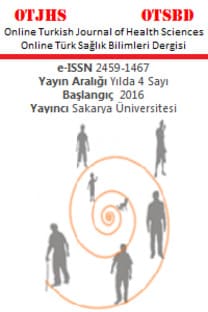Ebeveynin Okupasyonel Dengesi ve Çocuk-Ebeveyn İlişkisi
Ebeveyn, ebeveyn-çocuk ilişkisi, kronik hastalık
The Parental Occupational Balance and Child-Parent Relationship
Chronic disease, parent, parent-child relationship,
___
- King KL, Priddis LE, Kane RT. Enhancing maternal sensitivity and emotional well-being through a preventative parent–child relationship intervention in a community setting. J Child Fam Stud. 2015;24:1582-1592. doi:10.1007/s10826-014-9962-z
- Mei-Ju C, Chen-Hsin Y, Pin-Chen H. The beauty of character education on preschool children's parent-child relationship. Procedia Soc Behav Sci. 2014;143:527-533. doi:10.1016/j.sbspro.2014.07.431
- Saral B, Acar IH. Preschool children’s social competence: The roles of parent–child, parent–parent, and teacher–child relationships. Eur. Early Child. Educ. Res. J. 2021;29(6):856-876. doi:10.1080/1350293x.2021.1985557
- Boyer BP, Scott JK, Nelson JA. Maternal conflict behavior profiles and child social skills. Soc Dev. 2015;25(4):759-776. doi:10.1111/sode.12169
- Rossi AS, Rossi PH. Of Human Bonding: Parent-Child Relations across the Life Course. 1st ed. London: Routledge, Taylor and Francis Group; 2018.
- American Occupational Therapy Association. Philosophical base of occupational therapy. Am J Occup Ther. 2017;71:(7112410045).
- Cardin AD. Parents’ perspectives: An expanded view of occupational and co-occupational performance in the neonatal intensive care unit. Am J Occup Ther, 2020;74(2):7402205030p1-7402205030p12.
- Erlandsson LK, Eklund M. Levels of complexity in patterns of daily occupations: Relationship to women's well‐being. J Occup Sci . 2006;13(1):27-36.
- Wilcock AA, Chelin M, Hall M, Hamley N, Morrison B, Scrivener L, et al. The relationship between occupational balance and health: a pilot study. Occup Ther Int. 1997;4(1):17-30.
- İnal Ö, Özdemir DH, Turan FN. Occupational Balance, Fear and Agoraphobia in the Covid-19 Pandemic. Hacettepe University Faculty of Health Sciences Journal. 2022;9(1):207-222.
- McColl MA, Law MC, Stewart D. Theoretical Basis of Occupational Therapy. 3rd ed. Thorofare, NJ: Slack; 2015.
- Matuska K, Bass J, Schmitt JS. Life balance and perceived stress: predictors and demographic profile. OTJR (Thorofare N J). 2013;33(3):146-158.
- Uthede S, Nilsson I, Wagman P, Håkansson C, Farias L. Occupational balance in parents of pre-school children: Potential differences between mothers and fathers. Scand J Occup Ther. 2022:1-10. doi:10.1080/11038128.2022.2046154
- Günal A, Pekçetin S, Demirtürk F, Şenol H, Håkansson C, Wagman P. Validity and reliability of the Turkish Occupational Balance Questionnaire (OBQ11-T). Scand J Occup Ther. 2020;27(7):493-499.
- Akgün E, Yeşilyaprak B. Validity and Reliability Study of the Turkish Version of the Child-Parent Relationship Scale=Çocuk Anababa İlişki Ölçeği Türkçe Formunun Geçerlik ve Güvenirlik Çalışması. Balıkesir University The Journal of Social Sciences Institute: 2010;13 (24):44-53.
- Alpar R. Applied Multivariate Statistical Methods=Uygulamalı Çok Değişkenli İstatistiksel Yöntemler, Third Ed., Detay Publishing, Ankara; 2011.
- Donovan JM, VanLeit BJ, Crowe TK, Keefe EB. Occupational goals of mothers of children with disabilities: influence of temporal, social, and emotional contexts. Am J Occup Ther. 2005;59(3):249-261.
- Cantero-Garlito PA, Moruno-Miralles P, Flores-Martos JA. Mothers who take care of children with disabilities in rural areas of a Spanish region. Int J Environ Res Public Health. 23;17(8):2920. doi:10.3390/ijerph17082920
- Günal A, Pekçetin S, Wagman P, Håkansson C, Kayıhan H. Occupational balance and quality of life in mothers of children with cerebral palsy. Br J Occup Ther. 2022;85(1):37-43.
- Avrech Bar M, Jlole Majadla S, Bart O. Managing everyday occupations as a predictor of health and life satisfaction among mothers of children with ADHD. J Atten Disord. 2018;22(10):1008-1016.
- Bar MA, Jarus T. the effect of engagement in everyday occupations, role overload and social support on health and life satisfaction among mothers. Int J Environ Res Public Health. 2015;12(6):6045-6065.
- Hakansson C, Axmon A, Eek F. Insufficient time for leisure and perceived health and stress in working parents with small children. Work. 2016;55(2):453-461.
- Cabrera NJ, Volling BL, Barr R. Fathers are parents, too! Widening the lens on parenting for children's development. Child Dev Perspect. 2018;12(3):52-157.
- Raley S, Bianchi SM, Wang W. When do fathers care? Mothers’ economic contribution and fathers’ involvement in child care. Am J Sociol. 2012;117(5):422-1459.
- Pinquart M. Do the parent–child relationship and parenting behaviors differ between families with a child with and without chronic illness? A meta-analysis. J Pediatr Psychol. 2013;38(7):08-721.
- McSweeney S, Wilson C. Parental anxiety and offspring development: A systematic review. J. Affect. Disord. 2023; 327:64-78. doi:10.1016/j.jad.2023.01.128
- ISSN: 2459-1467
- Yayın Aralığı: Yılda 4 Sayı
- Başlangıç: 2016
- Yayıncı: Oğuz KARABAY
İnterferon-gamma ile İndüklenebilir Protein-10: COVID-19 Hastalığı için Bir Ölüm Göstergesi Değildir
Mahmud İSLAM, Hamad DHEİR, Elif ÖZÖZEN ŞAHİN, Selcuk YAYLACI, Abdülkadir AYDIN, Musa PINAR, Ertuğrul GÜÇLÜ, Ahmed Cihad GENÇ, Mehmet KÖROĞLU, Oğuz KARABAY
Rabia ÖZTAŞ KARA, Bahar SEVİMLİ DİKİCİER, Ahmet Can YAĞMUR, Ahmet KARA, Mahizer YALDIZ
Oral Antikoagülan Kullanan Covid-19 Hastalarının Hastane İçi Klinik Sonuçları
Salih ŞAHİNKUŞ, Selcuk YAYLACI
Atrial Fibrilasyonu olan Hastalarda Tiroid Fonksiyon Bozukluğunun Değerlendirilmesi
Tuba İNCE PARPUCU, Candan ALGUN, Uğur TOPRAK, Sefa TÜRKOĞLU
Yunus AKSOY, Abidin SEHİTOGULLARI
Aile Hekimlerinin İş Doyumu Düzeyini Etkileyen Faktörler ve Mesleki Benlik Saygısı İle İlişkisi
COVID-19 Pandemisinde Gebelikten Doğum Sonrasına Ruh Sağlığı: Boylamsal Bir Çalışma
Sidika Özlem CENGİZHAN, Esra GÜNEY, Esra SABANCI BARANSEL, Esra KARATAŞ OKYAY, Tuba UÇAR
Hemşirelerin Sosyodemografik Özelliklerine Göre Uyku Hijyeninin Değerlendirilmesi
Çiğdem Müge HAYLI, Gülendam HAKVERDİOĞLU YÖNT, Dilek DEMİR KÖSEM
